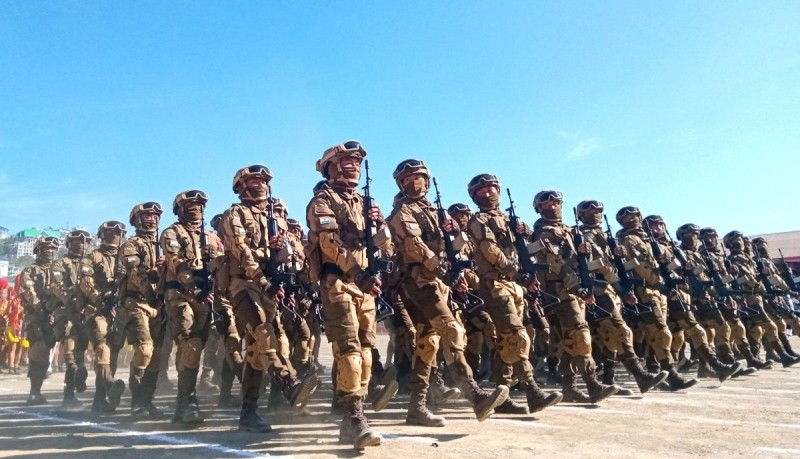Special Task Force of the Nagaland Police marching during the 57th Statehood Day celebration in Kohima on December 1, 2019. (Morung File Photo)

‘Here to keep the law for a peaceful environment’
Morung Express News
Dimapur | December 15
Law and order in the state, according to the Nagaland Police chief, T John Longkumer, has improved. He attributed the improved situation to the Ceasefire and in part, the performance of the state police.
The Director General of Police (DGP) made the comment in an interview as part of an interactive programme series— ‘Police & The Citizens- Empowering in Unison’ presented by Mokokchung Police in collaboration with the All India Radio, Mokokchung and Mokokchung Premier TV, first aired on December 11. It was later shared on social media platform of Mokokchung Police.
However, he noted that “extortion activities” has been alarming. On this, he said that the state police have done quite a lot over the past two years and things have improved and its activities have been at par with that of the Assam Rifles.
“If you compare the statistics, we are equal with them in the terms of arrest and recoveries of weapons and so on,” he said. As a testament, he reminded that Nagaland was adjudged best in law and order among small states by a national organisation based on “statistics.”
When the interviewer prodded as to why the Disturbed Area Act was in force despite being relatively peaceful the DGP diplomatically replied that it was above his “pay grade” to comment.
He however said that it can be relooked if and when there is a final “agreement” the between the Naga Political Groups and Government of India.
Responding to how he imagines a possible “solution,” Longkumer said that the proceeding is being closely followed.
According to him, the ideal situation would be that where all the groups are party to it. He also said that there would be “certain miscreants,” who would take advantage of the “void” and continue extorting. While stating that the police are geared for such elements, he said, “I say that we are here to keep the law and order and we want a peaceful environment, no more extortions. Those who do try to breach the agreement, we will be very harsh, we will come down strongly according to the law of the land.”
Police & modernising
“We have created such a good reputation (anti-naxalite operations in Chhattisgarh and Bengal as well as election related assignments) that they keep asking for more,” he noted.
However, he disclosed that requests were made to the Ministry of Home Affairs (MHA) to spare the Nagaland Police this year because of “our own issues here,” but it was apparently not taken.
“I suppose we are victims of our own success,” he said, while informing that 15 companies from the state police were sent to West Bengal (Bihar) for election duties.
On keeping pace with Information Technology, he said that digitizing the police department is on. He disclosed that the MHA has given “some sanctions” after Prime Minister Narendra Modi’s call to digitizing policing at the 2018 DGPs and IGPs conference.
The opening of the cyber lab in Dimapur was one such initiative, he said, informing that already about 300 officers have been trained by specialists from all over the country.
He also informed that the State Police is trying to “digitize all our records” starting from the police stations.
Goals before retirement
Improving police welfare, enhancing insurance cover for police personnel, strengthening training, improving investigation skills and expanding the DGP’s sports company are among his primary goals during his stint as the state police chief.
Stating, “It all depends on the investigation of the officers and also the forensic department,” he added that the department have invested in equipments and improving investigations skill.
He said that the NAP units have been “doing so well” and to maintain that standard, he said that the armed personnel are being trained at the Counter Insurgency and Anti-terrorism School (CIATS), Ruzaphema, established in 2019.
In sports, he said that he dreams to revive the glory days of the 1970s when the Nagaland Police’s IGP XI (football) was known all over the country. He recalled that a member (C Akum) of that team represented India.
Police-public relations
Longkumer asserted that there should be a strong bonding between the police force and the citizenry.
He said, “In our state, the civil societies are very important to the fabric of our society. They are the ones who raise issues; they are the ones who speak out when something is wrong.”
“We (police) are also part of that social environment. We have to be partners, communicate with them so that we understand each other. It’s very important,” he added.




